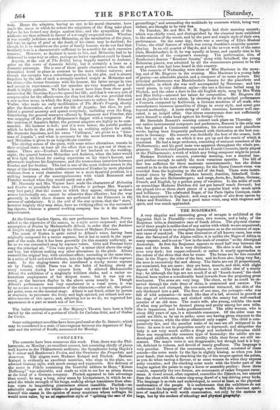CONCERTS.
The concerts have been numerous this week. First, there was the Phil- harmonic, on Monday; an excellent concert, but consisting chiefly of pieces well known to the Philharmonic audience; the Symphonies being Haydn's in C minor and Beethoven's Eroica, and the Overtures the Freyschfitz and Anacreon. The singers were Madame Knispel and Pischek. Madame Knispel is evidently an excellent musician, who sings in the plain, un- adorned German style, with much energy and expression. Her delivery of the scene in Fidelio containing the beautiful address to Hope, " Komm Hoffnung!" was admirable, and made us wish to see her as prima donna at the head of a German company. Pischek appeared to less advantage than usual: he sang a long, noisy scene by Lindpaintner, in which he ex- erted the whole strength of his lungs, making abrupt transitions from abso- lute roars to languishing pianissimos almost inaudible. Pischek—an admirable singer on the whole—is perhaps not aware that he is injuring himself this season in the opinion of many musicians whose suffrages he would most value, by an ad captandum style of "splitting the ears of the groundlings," and astounding the multitude by contrasts which, being very violent, are thought to be very fine. On Tuesday, Mr. and Mrs. W. H. Seguin had their morning concert; which was chiefly vocal, and distinguished by the classical taste exhibited in the selection of the music, and by the pure and simple style of their own performance. On the same day, there was a meeting of Ella's Musical Union; the chief feature of which was young Joachim's exquisite quartet- playing. In an old quartet of Haydn, and in the newest work of the same class, Mendelssohn's in D, he was equally at home, and equally true in his interpretation of the composer's meaning. The performance, also, of Beethoven's famous " Kreutzer Sonata," along with Schnlhoff, the young Bohemian pianist, was admitted by all the connoisseurs present to be the most perfect that had been heard in this country.
The concerts of Wednesday were those of Miss Macirone in the morn- ing, and of Mr. Blagrove in the evening. Miss Macirone is a young lady of genius—an admirable pianist, and a composer of no mean powers. Her principal performance was Mendelssohn's Sonata for the pianoforte and violoncello; in which she was well accompanied by, Hausman: and two vocal pieces, in very different styles—the one a German ballad sung by Pischek, and the other a duet in the old English style, sung by Mrs. Weiss and Miss Dolby—attested her talent for composition. Mr. Blagrove did not do justice to his own talent, by choosing for his principal performance a Fantasia composed by Kalliwoda, a German musician of all work, who manufactures immense quantities of things in every style, and never gets beyond mediocrity. A mere string of violin exercises, however well exe- cuted, is an insipid affair. Our clever countryman does not sufficiently exert himself to make head against his foreign rivals.
Mr. Sterndale Bennett's morning concert took place on Thursday. Of our native instrumental composers and performers, Bennett is the only one who has gained a Continental reputation; his overtures and pianoforte works having been frequently performed with distinction at the best con- certs in Germany. His concert was decidedly the best of the season, both in regard to the scale on which it was got up and the music of which it consisted. He had a large orchestra, consisting of eminent members of the Philharmonic; and his good taste was apparent throughout the whole pro- - gramme. His own chief performance was his Fourth Concerto, lately played at the Philharmonic; a work of which any living composer might be proud.
Madame Dulcken's concert, yesterday morning, was a musical ban- quet profuse enough to satisfy the most voracious appetite. The bill of fare was sufficient for three moderate entertainments; but the dishes seemed to be to the taste of the company, for the Opera Concert-mom was crowded from the beginning to the end of the feast. There were instru- mental pieces by Madame Dulcken herself, Joachim, Schulboff, Gode- froid, and the two Hellmesbergers; and songs, duets, &c., Italian, German, French, and English, by a perfect army of vocalists. In the midst of such an assemblage Madame Dulcken did not put herself much forward; but she played two or three short pieces of a popular kind with much spirit and brilliancy. The celebrated Roger, of the Paris Opera Comique, made his first appearance in England; and sang a couple of airs from operas by Adam and Boieldieu. He has a good tenor voice, sang with elegance and spirit, and was much applauded.


























 Previous page
Previous page